3 reasons killing DACA would be bad politics for Trump
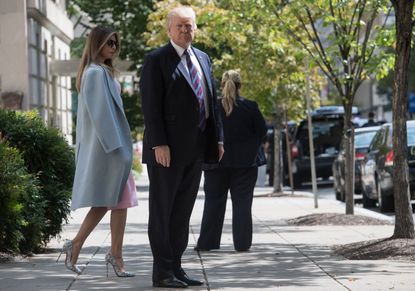

On Tuesday, a reportedly deeply conflicted President Trump is expected to send Attorney General Jeff Sessions out to announce an end to the Deferred Action on Childhood Arrivals (DACA) program for some 800,000 immigrants brought to the U.S. illegally as children, but give Congress six months to come up with a solution before Trump's action takes effect. Nothing is final until Trump gives the word, however, the White House emphasized. Killing DACA would fulfill a campaign promise but appear to violate Trump's presidential pledge to treat DREAMers with "heart" and give them no cause for alarm.
Over the weekend, an "exasperated" Trump asked his aides for "a way out" of this DACA dilemma, two people familiar with the exchange told The New York Times. But the six-month compromise crafted by White House Chief of Staff John Kelly will please nobody. Here are three reasons ending DACA is bad politics for Trump.
1. Unlike some other immigration issues, allowing DREAMers to stay has broad support, even among Republicans. These aren't Trump's gang-banging "bad hombres," they're college students, tax-paying young professionals, members of the U.S. armed forces, and people who die trying to save fellow Houstonians from floodwaters.
Subscribe to The Week
Escape your echo chamber. Get the facts behind the news, plus analysis from multiple perspectives.

Sign up for The Week's Free Newsletters
From our morning news briefing to a weekly Good News Newsletter, get the best of The Week delivered directly to your inbox.
From our morning news briefing to a weekly Good News Newsletter, get the best of The Week delivered directly to your inbox.
2. Trump's relationship with congressional Republicans is already strained enough without Trump throwing what one official describes to the Times as "an unpinned hand grenade at Capitol Hill Republicans." Moderate and several conservative Republicans, plus all Democrats, support extending residency if not a path to citizenship to DREAMers, but the devil is in the details, and Congress already has fragile debt-ceiling negotiations, spending bills, and hurricane relief to pass this fall, not to mention tackling the GOP wish list of tax cuts.
3. Trump is already "cornered, weakened," and isolated, and now he's frittering away his remaining power by "shooting the hostages," Ben Smith writes at BuzzFeed News. Instead of holding the Obama-era "hostages" — the Paris climate accord, TPP trade deal, Iran nuclear deal, and DACA — for political leverage, he's choosing attention-grabbing terminating over power. "Now, if Trump kills DACA to please his base he'll be getting the worst of both political worlds," Smith argues. "He'll inflict real pain on hundreds of thousands of people to reassure his 30-some percent that he's with them. And politically speaking, he'll have given up a bargaining chip for nothing, and spent away a bit more of his political capital. That's not strategy, it's a panicked move in a corner."
Create an account with the same email registered to your subscription to unlock access.
Sign up for Today's Best Articles in your inbox
A free daily email with the biggest news stories of the day – and the best features from TheWeek.com
Peter has worked as a news and culture writer and editor at The Week since the site's launch in 2008. He covers politics, world affairs, religion and cultural currents. His journalism career began as a copy editor at a financial newswire and has included editorial positions at The New York Times Magazine, Facts on File, and Oregon State University.
-
 The murky role of military contractors in war
The murky role of military contractors in warThe Explainer A civil case against US company has revived debate over the increasing use of private security firms in military operations
By Richard Windsor, The Week UK Published
-
 The week's best photos
The week's best photosIn Pictures Playful goslings, an exploding snowman, and more
By Anahi Valenzuela, The Week US Published
-
 What is rock flour and how can it help to fight climate change?
What is rock flour and how can it help to fight climate change?The Explainer Glacier dust to the rescue
By Devika Rao, The Week US Published
-
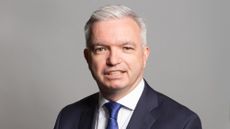 Mark Menzies: Tories investigate MP after 'bad people' cash claims
Mark Menzies: Tories investigate MP after 'bad people' cash claimsSpeed Read Fylde MP will sit as an independent while party looks into allegations he misused campaign funds on medical expenses and blackmail pay-out
By Arion McNicoll, The Week UK Published
-
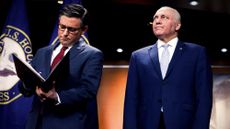 Why Johnson won't just pass Ukraine aid
Why Johnson won't just pass Ukraine aidSpeed Read The House Speaker could have sent $60 billion in military aid to Ukraine — but it would have split his caucus
By Peter Weber, The Week US Published
-
 Sudan on brink of collapse after a year of war
Sudan on brink of collapse after a year of warSpeed Read 18 million people face famine as the country continues its bloody downward spiral
By Peter Weber, The Week US Published
-
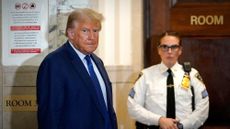 Trump's first criminal trial starts with jury picks
Trump's first criminal trial starts with jury picksSpeed Read The former president faces charges related to hush money payments made to adult film star Stormy Daniels
By Peter Weber, The Week US Published
-
 How will Israel respond to Iran's direct attack?
How will Israel respond to Iran's direct attack?Speed Read Iran’s weekend attack on Israel could escalate into a wider Middle East war
By Peter Weber, The Week US Published
-
 US, Israel brace for Iran retaliatory strikes
US, Israel brace for Iran retaliatory strikesSpeed Read An Iranian attack on Israel is believed to be imminent
By Peter Weber, The Week US Published
-
 Congress honors real-life Rosie the Riveters
Congress honors real-life Rosie the RivetersSpeed Read These American women reshaped the work force during World War II
By Peter Weber, The Week US Published
-
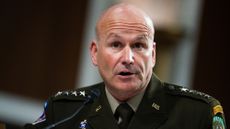 Outgunned Ukraine could fall, US general warns
Outgunned Ukraine could fall, US general warnsSpeed Read Without more US aid, Ukraine is at risk of losing the war
By Peter Weber, The Week US Published